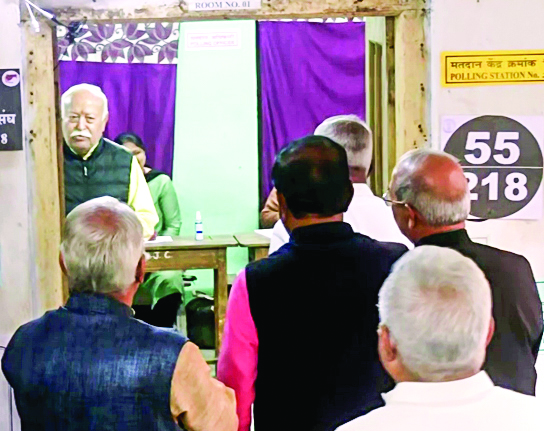BJP’s strength lies in central leadership, Sangh’s support, and Yogi Adityanath’s growing influence as Hindutva’s prominent face in elections.
New Delhi: The Rashtriya Swayamsevak Sangh (RSS) has played a key role in securing victories for the Bharatita Janata Party (BJP) in Maharashtra after its success in Haryana, showcasing its growing influence and making it increasingly difficult for the opposition to counter its strength. Since the Lok Sabha elections, the RSS has emerged as a significant force, posing a challenge to the opposition’s chances of regaining power for the next two to three decades. Sources indicate that the RSS organised 66,000 small-scale meetings in Maharashtra alone, twice the number held in Haryana. Maybe the reason the opposition continues to lose ground, especially in Hindi-speaking states. The Congress party, as the primary opposition force, faces a critical situation. Out of power at the center for over a decade, it now governs only three states and has weakened organisationally; lost many committed workers it once relied on. The party’s current leadership consists largely of those who mislead the Gandhi family while remaining in the fold. With no accountability being enforced, long-serving office bearers have grown complacent, further exacerbating the party’s decline.Only those actively working within an organisation should be promoted.
The BJP has become powerful due to its strong central leadership and the support of a selfless organisations like the Sangh. Uttar Pradesh Chief Minister Yogi Adityanath has also emerged as a prominent face of Hindutva. The elections in Haryana, Maharashtra have demonstrated Yogi’s growing role as a key figure in shaping the Hindutva narrative and contributing significantly to the BJP’s success.
In the Uttar Pradesh by-elections, Yogi Adityanath reversed the opposition’s gains from the Lok Sabha elections, bringing them back to their earlier position. Prime Minister Narendra Modi’s impeccable image, Amit Shah’s expertise in election strategy, and Yogi’s ability to gauge the situation effectively make them formidable. Their ideology, centered on Hindutva and nationalism, is clear. The Sangh’s grassroots workers, blending in as common people
The RSS and BJP analysed their shortcomings during the Lok Sabha elections, shifted their focus to upcoming contests, and managed to turn the situation around within four months. The key lies in learning from mistakes. In contrast, if the Congress had learned from the strategies and mistakes of the BJP and RSS, the country might have had a strong opposition today. However, the Congress finds itself surrounded by individuals who seem to be steering it towards decline, possibly even intentionally. The party appears unwilling to reflect on its errors and draw meaningful lessons from them.
Although the Gandhi family has managed to keep the Congress party united, the family itself is now under scrutiny. Until the Gandhi family makes firm decisions and enforces accountability, the party will continue to weaken. They need to take decisive action against leaders who repeatedly fail. Those holding key positions but failing consistently should be removed, and new individuals should be given opportunities. Without the fear of losing their positions, leaders will not perform effectively, and the party will keep facing defeats. However, the Gandhi family is unlikely to take responsibility, as Congress operates as a family-centric party.
Among the Opposition parties, only Congress has a national presence, while the others are primarily regional parties.
The Congress has become heavily reliant on regional parties, which has significantly weakened its position. In an attempt to counter ongoing defeats and allegations of nepotism, Rahul Gandhi appointed Mallikarjun Kharge, a non-Gandhi, as the party president. However, this move appeared largely symbolic, as Rahul Gandhi remained active and retained the real decision-making power. This lack of clarity in leadership failed to send a strong message to the public.
The party’s continued electoral losses are a serious warning sign. If Rahul Gandhi does not take decisive action, the Congress risks losing elections for the third time even in a stronghold like Kerala. Prospects in other states appear equally bleak. With crucial elections approaching in Bihar, Delhi next year, and Kerala in 2026, the stakes for the Congress have never been higher.

